 Headline News
Headline News
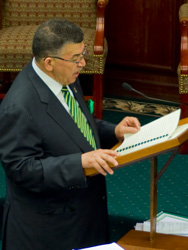
Mac under pressure to enshrine 21 day rule
 (CNS): Following mounting controversy over the government’s continued suspension the public consultation period for new laws and amendments, the opposition has submitted a motion calling for the necessary changes to be enshrined in the Legislative Assembly’s rules. The Cayman Islands Constitution 2009 says that the Legislative Assembly Standing Orders require that all laws brought by government need to be published at least 21 days before the meeting except in the case of an emergency. In its first report published last month the Constitutional Commission also called on the government to amend the House rules to formalise the period of public debate and discussion and comply with the Constitution. (Photo by Dennie Warren Jr)
(CNS): Following mounting controversy over the government’s continued suspension the public consultation period for new laws and amendments, the opposition has submitted a motion calling for the necessary changes to be enshrined in the Legislative Assembly’s rules. The Cayman Islands Constitution 2009 says that the Legislative Assembly Standing Orders require that all laws brought by government need to be published at least 21 days before the meeting except in the case of an emergency. In its first report published last month the Constitutional Commission also called on the government to amend the House rules to formalise the period of public debate and discussion and comply with the Constitution. (Photo by Dennie Warren Jr)
Although the current standing order 45 requires that all potential bills be published and gazetted before a bill is read for a second time in the LA, the government has suspended this order via a vote in the House on a considerable number of occasions since taking office. In a recent interview with Cayman 27 the premier justified the suspensions as he said the laws were needed to facilitate the country’s offshore business and he did not have time to waste.
However, the problems associated with rushing laws through the assembly were highlighted recently with the Dormant Accounts Bill. Although Bush had told his legislative colleagues that the financial sector had been consulted at the time the bill was brought to the House, since then it has been revealed that the industry had very grave concerns about the damage that the law could do to offshore business. The law was designed to give government access to the funds in accounts that had been abandoned but the legislation appears to encroach on long term investment products as well.
In a twelve-page memo to government, the Financial Services Legislative Committee said that because the necessary experts were not consulted before government passed the law it had potentially dangerous consequences for the financial services industry. The sub-committee said that unless it was changed it would have “a serious and irreversible adverse impact" on what was revealed to be a long list of key financial service industries, from investment funds to private wealth management services.
This was one of a number of bills rushed through the House over the last year or so and the Constitutional Commission has called on government to amend Standing Orders to reflect the Constitution. Wil Pineau (one of three constitutional commissioners) said the concept of what constitutes an emergency then has to be defined. He pointed out that if government was suspending orders every time, then it clearly cannot be extraordinary or an emergency.
The opposition motion presented by Alden McLaughlin and seconded by Kurt Tibbetts is expected to be debated in the House this week, if it makes it to the order paper, and calls on government to take the necessary steps to comply with section 77(2) of the Cayman Islands Constitution Order and amend the Standing Orders as soon as possible.
The public consultation period is not just a provision for the opposition to debate a particular bill, but also allows the public to read and consider government’s proposed legislation and for the man in the street to raise concerns or offer support.
Speaking on Cayman 27’s "Lets Talk to the Experts" on Monday evening, Human Rights Commission Chair Richard Cole pointed out that it is part of the wider democratic process which allows the people to tell their own MLAs what they think of a bill that is coming before the Legislative Assembly and whether or not they want their elected representatives to support it or not.
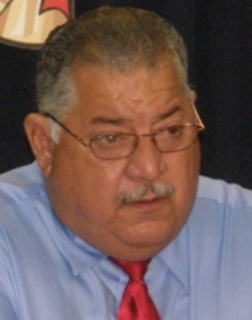
Bush broke law, says Tibbetts
 (CNS): Full story – The premier has contravened both the law and established practice in choosing the company which will be supplying government’s CI$155 million loan, the leader of the opposition has said. During a national broadcast on Monday night, Kurt Tibbetts raised concerns over the way the premier has, he said, unlawfully overridden the recommendation of advisers in his own ministry, as well as the Central Tenders Committee, when he handpicked the New York firm to provide the money. The PPM leader also asked if the deal really is in the best interests of the country, as claimed by McKeeva Bush, as the premier’s own technical team did not think so.
(CNS): Full story – The premier has contravened both the law and established practice in choosing the company which will be supplying government’s CI$155 million loan, the leader of the opposition has said. During a national broadcast on Monday night, Kurt Tibbetts raised concerns over the way the premier has, he said, unlawfully overridden the recommendation of advisers in his own ministry, as well as the Central Tenders Committee, when he handpicked the New York firm to provide the money. The PPM leader also asked if the deal really is in the best interests of the country, as claimed by McKeeva Bush, as the premier’s own technical team did not think so.
Calling for full and frank disclosure as to the details of the deal, the opposition leader raised concerns about why the premier had become so closely involved in the awarding of a government contract, especially as his own ministry officials recommended a different bid, which they and the Central Tenders Committee all agreed offered the best valuefor money.
“What is extremely concerning and highly irregular, is that the premier has contravened both the law and established practice in choosing the company which will provide this financing to the government,” Tibbetts told the country. “The premier has unlawfully overridden the recommendation of the advisers in his own ministry, the Ministry of Finance Technical Evaluating team, as well as the decision of the Central Tenders Committee and has handpicked a New York firm to provide this financing.”
Government recently announced that it had secured the financing for a loan of US$185 million to plug the budget gap with Cohen and Company, a firm based in New York. However, it was soon revealed that the company had not been recommended by the CTC and the premier himself had entered into the negotiations regarding the deal. The Public Management and Finance Law requires government to tender all public contracts over CI$250,000 but gives no authority to the premier or any minister to award contracts.
Tibbetts said that the premier had acted unlawfully when he ignored the recommendations from officials and the CTC to award the contract to a joint venture of two local banks, Royal Bank of Canada and FirstCaribbean. He said this was confirmed by the Chairman of the Central Tenders Committee, Ronnie Dunn, who had explained what had happened in an e-mail read out on the Rooster talk show.
“There is no provision in our legislation that I am aware of which allows for the overriding of the CTC decision. And I would invite anyone who knows different to quote that section of the law which allows that,” Dunn had said.
Tibbetts further questioned the premier’s claim that he had acted in the best interests of country and was saving many millions of dollars in interest costs with the selection of Cohen and Company since the interest rate for the deal remained a mystery. “Despite announcing the award of the financing contract to Cohen and Company, the premier has been unable or unwilling to say what the terms of the arrangement are,” Tibbetts stated. “Curiously, it would appear from what the premier has said that the crucially important issue of the interest rate that will be charged on this loan agreement has not yet been agreed and is still being negotiated even after the financing contract has been awarded.”
In addition to what he said was the unlawful nature of the award, Tibbetts raised concerns about whether this deal is really in the best interests of the Cayman Islands as well as the manner in which the firm was singled out for special treatment by the premier in his involvement with the tendering process.
“This is a grave and monumental step for the elected leader of the country to take,” he stated “The first obvious question therefore is, why? The premier says it was to save the country money. But he has not said how. Nor has he explained why he personally went to Cohen and Company’s offices in New York and invited them to make another proposal after the Central Tenders Committee had already decided to award the financing contract to Royal Bank and FirstCaribbean.”
The PPM leader also pointed out that the premier has not explained why other bidders were not invited to engage in negotiations or present other proposals as Cohen and Company had been. “Nor has he told the country why Cohen and Company was singled out for special treatment in this way,” Tibbetts added.
A lot was at stake, he said, as government was borrowing the single largest sum ever and it was critically important that the country gets the best possible deal. He said with so very little in terms of detail being provided about this deal, set against unconfirmed reports that one bid contained a proposal with a 3.5% interest fixed for 15 years with no associated fees, it was difficult to see how the people could be certain the premier’s choice would offer the best deal.
Tibbetts maintained that, despite the premier’s position that the process was less important than getting a good deal, the process was critically important.
“When due process is not followed it opens up the ominous prospect of corruption,” Tibbetts warned. “There are huge reputational implications for the Cayman Islands Government here. It should not be forgotten by the premier in his desire to have his financier of choice that it is the Cayman Islands Government’s reputation for probity and reliability that has made it relatively easy for it to secure financing, even in these hard economic times. The spectre of corruption has the capacity to undermine any government’s reputation, including ratings by Standard and Poors and Moodys.”
He noted that if potential bidders believe that the process of awarding contracts is not fair, predictable and transparent then the attractiveness of this jurisdiction is lost, with potentially dire consequences.
The opposition leader noted that an award to local banks would have also been more beneficial for the local economy, which was now lost.
Calling for full and frank disclosure by the premier of the details and circumstances surrounding the award, Tibbetts said the government needed to explain the reasons why Cohen and Company were singled out and the other bidders excluded. He asked for the disclosure of all documentation related or connected to the tendering process and a report by the attorney general regarding the legality of overriding the decision of the Central Tenders Committee to award the financing contract to Royal Bank of Canada and FirstCaribbean. Tibbetts also said there needed to be a special investigation by the auditor general into the circumstances surrounding the tendering process and the award to Cohen and Company.
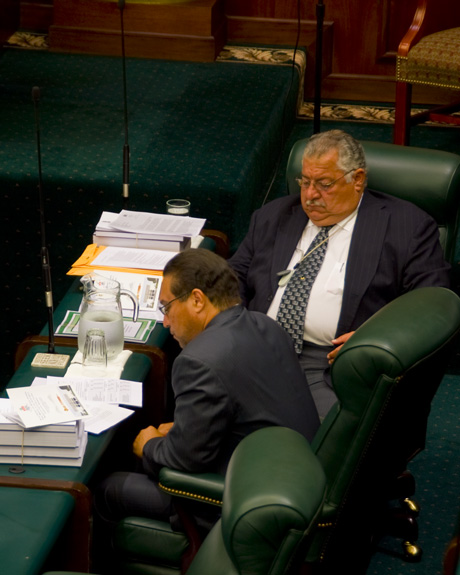
Opposition fights to be heard
 (CNS): The role of the Legislative Assembly as a place of democratic debate is being further undermined as a result of government ignoring parliamentary questions, the opposition has claimed. PPM member for George Town, Alden McLaughlin, says government has still not answered more than ten questions submitted by the opposition in the last session as they are required to do under Standing Orders. Aside from rushing through laws and suppressing debate on bills and amendments, he accused government of closing down the opposition’s only other options of querying the workings of government through parliamentary questions and members’ motions. (Photo Dennie Warren Jr)
(CNS): The role of the Legislative Assembly as a place of democratic debate is being further undermined as a result of government ignoring parliamentary questions, the opposition has claimed. PPM member for George Town, Alden McLaughlin, says government has still not answered more than ten questions submitted by the opposition in the last session as they are required to do under Standing Orders. Aside from rushing through laws and suppressing debate on bills and amendments, he accused government of closing down the opposition’s only other options of querying the workings of government through parliamentary questions and members’ motions. (Photo Dennie Warren Jr)
The former Cabinet member pointed out that the opposition cannot just raise issues at will in the Legislative Assembly, and in order for them to represent the people as an opposition they have to get the topical issues that people want addressed onto the business papers of each legislative session.
“The only time we are permitted wide debate is during the throne or budget speeches, otherwise we are limited in the matters we can raise,” McLaughlin said. “In order to bring matters before the House for debate the opposition must file private members motions or ask parliamentary questions, otherwise the legislature is limited to the government’s agenda.”
With just a few avenues open to them, McLaughlin said government was closing the opposition down by stonewalling, ignoring questions and not placing opposition motions on the business agenda.
“We have over ten questions outstanding from the last meeting which the government should now have answered in writing as they failed to answer them in the Legislative Assembly,” McLaughlin said. With still no written answers on the eve of the next meeting, the opposition had attempted to get the questions placed back on the order paper for this week but it has been turned down because of procedures.
Since government is expected to have followed the rules the Legislative Assembly, Standing Orders are silent on the issue of what the opposition can do when government simply ignores their questions. As a result, the Speaker is obliged to turn to Erskine May, which is the UK’s authoritative work on parliamentary procedures and is what the local legislatures turn to when the Cayman Islands Legislative Assembly Standing Orders are silent on a particular issue. That states that, as a rule, a questioner must wait three months to re-submit a parliamentary question.
As the House last met just two month ago, the opposition must wait until the next meeting before the questions which government should already have answered can be resubmitted. The George Town representative said the questions covered a diverse range of important topics, from the current state of government finances, the environmental impact assessment at the port, government money given to churches for hurricane defences, and what has happened to the legal aid report, all of which government will be a liberty to continue to ignore, he noted.
The government was being rewarded for abusing the process, McLaughlin observed, and while the opposition members would bide their time, this was just another example of the government’s contempt for what should be the most important place for debate.
“Technically it is correct that the questions have to wait, but the overriding consideration must be about service to democracy,” he said. “The parliamentary questions are a time honoured method by which the opposition can question the workings of government, but if government doesn’t reply in the Legislative Assembly and then does not, as is expected, submit answers in writing after the sitting then the democratic process is fundamentally undermined.”
McLaughlin said it went further than government simply ignoring the questions; they did not want answer. “This goes to the growing irrelevance of the Legislative Assembly for national debate as the government adjourns to the talk shows,” the opposition member added.
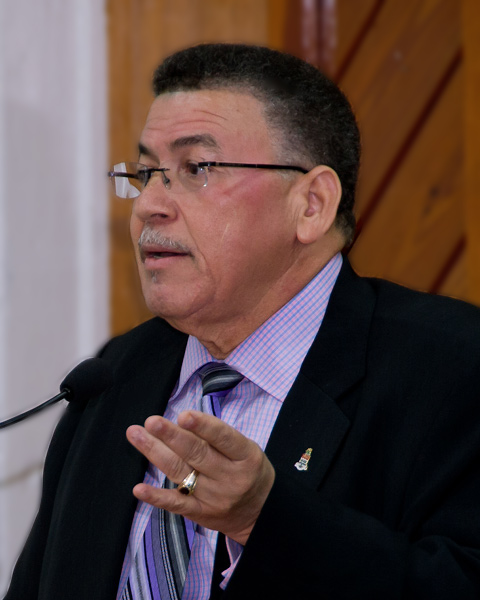
Mac to face Bodden Towners at public meeting
 (CNS): The premier’s press office has announced that McKeeva Bush will be holding the second in his planned series of town hall meetings next week. This time the premier will be meeting with the people of Bodden Town at the Civic Centre on Tuesday evening 2 November, beginning at 8 pm. The official release says the premier will be talking about government finances, what the government is doing to stimulate the economy and get people back to work, helping businesses, and the process involved in the selection of Cohen and Company. After his opening remarks the audience will have the opportunity to ask the premier questions directly. (Photo by Dennie Warren Jr)
(CNS): The premier’s press office has announced that McKeeva Bush will be holding the second in his planned series of town hall meetings next week. This time the premier will be meeting with the people of Bodden Town at the Civic Centre on Tuesday evening 2 November, beginning at 8 pm. The official release says the premier will be talking about government finances, what the government is doing to stimulate the economy and get people back to work, helping businesses, and the process involved in the selection of Cohen and Company. After his opening remarks the audience will have the opportunity to ask the premier questions directly. (Photo by Dennie Warren Jr)
During the first meeting hosted by Bush in George Town in September, at the newly renovated historic Peace Hall, the premier berated what he said was the bureaucracy getting in the way of government projects. He said there was a “silent, passive non-compliance” and a “dragging of feet” when people were opposed to government projects.
The premier also faced a considerable number of questions at the last meeting on topics ranging from the cruise port development project and unemployment.
In the wake of the premier’s decision to ignore his ministerial technical team’s advice to award the government financing contract to a joint bid from two local banks, as recommended by the Central Tenders Committee, and choose a foreign financier instead, together with the controversy surrounding the recent bid for the country’s CCTV, the premier is likely to face questions regarding the central tendering process.
The announcement of Joe Imparato’s plans to construct a commercial port in East End may also be another issue likely to be on the minds of the people of Bodden Town, as well as a number of local issues, such as the continued flooding problems in the district.
The second meeting will take place the night before the Legislative Assembly returns for its next meeting, when government is expected to bring a number of bills for amendment, including the tax concessions amendment bill. The country’s legislators will also be debating a number of private members motions and there are more than 14 questions set down by opposition and independent members to be asked of government ministers.

Robbers tie up victims
 (CNS): Updated – Police have now confirmed earlier reports on CNS that two men were tied up by armed suspects in the early hours of this morning during a robbery at the Ramada Grand Caymanian on the North Sound. At about 1.30 am Monday two members of staff were inside an office at the Ramada Grand Caymanian, when they were suddenly confronted by two masked men armed with what appeared to be handguns. The robbers tied the men up and left them locked in the office before the suspects entered another office which contained the safe. The victims remained tied up for around two hours before one of the men eventually managed to free himself and raise the alarm.
(CNS): Updated – Police have now confirmed earlier reports on CNS that two men were tied up by armed suspects in the early hours of this morning during a robbery at the Ramada Grand Caymanian on the North Sound. At about 1.30 am Monday two members of staff were inside an office at the Ramada Grand Caymanian, when they were suddenly confronted by two masked men armed with what appeared to be handguns. The robbers tied the men up and left them locked in the office before the suspects entered another office which contained the safe. The victims remained tied up for around two hours before one of the men eventually managed to free himself and raise the alarm.
It was then that they discovered that the robbers had forced open the safe and fled the scene with a sum of cash. Neither of the men at the resort were injured during their ordeal and no shots were fired by the robbers. The first suspect is described as having a dark complexion, 5’6” in height and weighing 200 – 200lbs. He was wearing a black t-shirt, dark blue faded jeans and black and white sneakers. He had a black ski mask covering his face.
The second robber had a slim build and was about 6’ in height. He was wearing a long sleeved hoodie with camouflage pants and white sneakers.
Detective Sergeant Richard Scott who is leading the investigation asked anyone with information to come forward.
“This was a terrifying ordeal for the two men involved – luckily they weren’t injured. Initial indications
are that this was a pre-planned robbery,” the detective said. “It could be that the two suspects had been watching the movements of staff for a few days prior to the actual incident. That’s why I’d be keen to talk to people who saw anything suspicious in the days and nights leading up to the incident, as well as anyone who may have been in the area around the relevant time this morning. The information you have may be vital to the enquiry and I’d ask you to get in touch with us as quickly as possible.”
DS Scott said information can be passed to the Criminal Investigation Department at George Town police
station on 949-4222 or the confidential Crime Stoppers number 800-8477 (TIPS).
This is now the second tourist location to be targeted by robbers following the recent robbery in the heart of Seven Mile Beach at the Grand Cayman Beach Suites last month.
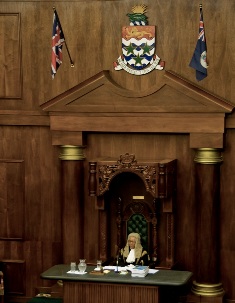
Tax and fees on LA agenda
 (CNS): The issue of taxes and fees and their potential reductions will be at the centre of parliamentary business this week when the country’s law makers return to the Legislative Assembly. Government will be bringing a bill to amend the tax concessions law to enlarge the scope of those exempt from taxes to include any entity that government feels is in the national interest. The opposition is also bringing a private member’s motion requesting the reduction in work permit fees and the independent member a motion to require developers who receive duty waivers to purchase the goods through local merchants in order to get those concessions to help boost the local economy. (Photo by Dennie Warren Jr)
(CNS): The issue of taxes and fees and their potential reductions will be at the centre of parliamentary business this week when the country’s law makers return to the Legislative Assembly. Government will be bringing a bill to amend the tax concessions law to enlarge the scope of those exempt from taxes to include any entity that government feels is in the national interest. The opposition is also bringing a private member’s motion requesting the reduction in work permit fees and the independent member a motion to require developers who receive duty waivers to purchase the goods through local merchants in order to get those concessions to help boost the local economy. (Photo by Dennie Warren Jr)
The Legislative Assembly resumes on Wednesday, when the government will be seeking support for the tax concessions amendment bill, which will enable the Cabinet to offer duty and fee waivers whenever government considers it to be of benefit to the country. The law will give the Cabinet the power to offer developments such as the proposed medical city, the cruise dock or the commercial port any tax exemptions they see fit.
Meanwhile, on the opposition benches Alden McLaughlin will be presenting a private members motion, seconded by Ezzard Miller, asking government to reduce the work permit fee increases. The third elected member for George Town says in his motion that statistics show a marked decline in the number of work permit holders in the Cayman Islands since the increases were imposed, and with many businesses under financial pressure, just as government has recently reduced the key employee fees, it should now consider reducing the fees for all work-permits.
The North Side representative will also be presenting his own private members motion, supported by East End opposition member, Arden McLean, asking government to require those developers who have been granted a reduction or special waiver of duties to buy the goods they need from local sellers instead of directly importing the goods themselves to ensure the money passes through the local economy.
As well as various other amendments and private members motions, there are some fourteen parliamentary questions tabled by the independent and opposition members to be asked of the premier and Cabinet members, from the current situation with the cruise berthing development and the current status of derelict tourism properties to questions regarding the proposed East End Sea port and the controversial government loan.

Guns in toy case back in court
 (CNS): Following a mistrial in March of this year Cassandra Bodden (26) will be facing a jury for the second time on Monday as the case against her for the importation of firearms and ammunition’s returns to court.Bodden is charged with attempting to import four guns and 420 rounds of ammunition which were found hidden in a model car. Justice Howard Cooke ordered a re-trial when the jury of four men and three women could not agree on a verdict. The prosecution states that Bodden knew about the contents of the packageand claimed ignorance to cover her tracks. Bodden however has protested her innocence saying she did not know what was in the package and had made it abundantly clear she did not know to a number of law enforcement officials. (Photo Dennie WarrenJr)
(CNS): Following a mistrial in March of this year Cassandra Bodden (26) will be facing a jury for the second time on Monday as the case against her for the importation of firearms and ammunition’s returns to court.Bodden is charged with attempting to import four guns and 420 rounds of ammunition which were found hidden in a model car. Justice Howard Cooke ordered a re-trial when the jury of four men and three women could not agree on a verdict. The prosecution states that Bodden knew about the contents of the packageand claimed ignorance to cover her tracks. Bodden however has protested her innocence saying she did not know what was in the package and had made it abundantly clear she did not know to a number of law enforcement officials. (Photo Dennie WarrenJr)
When Bodden went to clear the package through a local shipping agent and customs, she did so in the company of a police officer. In the previous trial defence counsel Ben Tonner claimed that his client should never have been charged as she simply did not know about the guns and had alerted the authorities on several occasions to the fact that she was not expecting anything from the United States, which is where the package originated.
During the trial Tonner said that the arrest and charges against Bodden sent a terrible message to the community that by being honest people could find themselves in the same position — in court facing a risk to their liberty. The lawyer stated that if his client had remained quiet the inspection would never have happened and the guns could have made their way on to the street.
However the crown contends that Bodden knowingly imported the four firearms, described as a .40 Smith and Wesson, a 9mm Ruger, a .45 Glock model 21, and a 9mm Arcus as well as 420 bullets, in April 2009. Prosecutors say Bodden appeared to have knowledge of the content of the package without having been informed by the shipping agent and her failure to turn up for a planned inspection pointed to her guilt.

AG probes tender process
 (CNS): The system by which government secures goods and services is to be reviewed by the Auditor General’s Office as a result of issues revealed during the bidding process for the National Closed Circuit Television contract. Alastair Swarbrick said on Friday that he had decided to take a closer look at the central tendering and procurement process as there were concerns that it was not achieving value for money for the public purse. Despite claims by the premier that it was as a result of difficulties he encountered when trying to secure government’s loan of $155 million that he had instructed the audit office to examine the tendering process, the auditor general said the decision follows audit work he had undertaken regarding the CCTV contract.
(CNS): The system by which government secures goods and services is to be reviewed by the Auditor General’s Office as a result of issues revealed during the bidding process for the National Closed Circuit Television contract. Alastair Swarbrick said on Friday that he had decided to take a closer look at the central tendering and procurement process as there were concerns that it was not achieving value for money for the public purse. Despite claims by the premier that it was as a result of difficulties he encountered when trying to secure government’s loan of $155 million that he had instructed the audit office to examine the tendering process, the auditor general said the decision follows audit work he had undertaken regarding the CCTV contract.
“As a result of a request by the governor, a discussion with the premier, and audit work I have recently commenced on the National Closed Circuit Television tendering process, I have decided to conduct a wider scope audit of the government’s procurement process at this time,” said Swarbrick in a statement released by his office on Friday morning. “There have been concerns raised that the current procurement process followed by the Cayman Islands Government does not obtain results that ensure the best value for money. Therefore, the audit will focus on this aspect and other areas of the procurement process.”
He added that the audit would commence immediately and would be reported to the Legislative Assembly early in 2011, and he said he would discuss the results of the audit once the report was public.
The central tendering process was brought sharply into the spotlight this week when it was revealed that the premier had elected to bypass recommendations from his own ministerial technical team which had been approved by the Central Tenders Committee over the deal to supply government with long term financing of CI$155 million.
In an address to the nation on Wednesday evening, in which McKeeva Bush justified his decisionbecause he said it would offer greater value for money and save the country millions of dollars, he suggested that the tending process was flawed. He said it did not allow for negotiation and this was why he was seeking to address the way tendering currently works.
“What this experience has taught me is that the tendering process needs to be revamped. With the support of my ministerial colleagues, I have already asked for the auditor general’s assistance in making recommendations for changes to the tendering process that will result in a more efficient, modern and sensible process,” he said.
At present the process of tendering involves both the technocrats in the ministry wishing to procure those goods or services and the Central Tenders Committee, but not the ministers or other elected officials involved in the policy decision.
Following the deadline on the request for proposals, the technical team from the government agency in question and the CTC meet to open the bids. The technical team and CTC make a preliminary examination of each of the bids that has been submitted, ensuring they are valid and have met the basic criteria.
Following that, the agency’s technicians then go away and examine the bids more closely and choose which one they feel best suits the needs of the job/service/goods required and which offers the best value for money. They then write a report justifying their choice, which is examined by the CTC, who vote on whether to agree or disagree with the technicians. If the CTC agrees with the technical team, the contract is awarded. If not, the technical team is asked to re-examine all the bids and try again or the process can be re-tendered.
It is not clear what the questions were that caused the AG concern regarding the CCTV bid but it is understood there were some delays in the process.
Questions have also been raised in the wider community about outside interference with the bids and that the way in which requests for proposals are written has the potential to be skewed towards a specific potential bidder.
The Commission for Standards in Public Life (CSPL) created under the Constitution has already stated that the central tendering process will be one of its priority areas as called for under the Constitution and that it would also be examining contracts which fall outside the remit of CTC (those worth less than $250,000) and how those public contracts are awarded. The CSPL, however, has indicated that it needs supporting legislation if it is to successfully call into question the way a particular contract has been awarded.

Most accounts late again
 (CNS): Following a freedom of information request submitted by CNS in September, the Auditor General’s Office has now revealed that less than half of the government entities obligated to summit their annual accounts to the office by 31 August managed to do so. Despite extra cash from the public purse on accountants to help with the backlog, freeing financial officers to focus on making the reporting deadlines for this year’s accounts, 21 of the 37 entities failed to make the legal deadline. Although CNS had requested a full breakdown of which government entities had made the 31 August date, which was refused, after mediation the AG agreed to reveal that six of the 12 ministries and portfolios had made the deadline and 10 of the 25 statutory authorities.
(CNS): Following a freedom of information request submitted by CNS in September, the Auditor General’s Office has now revealed that less than half of the government entities obligated to summit their annual accounts to the office by 31 August managed to do so. Despite extra cash from the public purse on accountants to help with the backlog, freeing financial officers to focus on making the reporting deadlines for this year’s accounts, 21 of the 37 entities failed to make the legal deadline. Although CNS had requested a full breakdown of which government entities had made the 31 August date, which was refused, after mediation the AG agreed to reveal that six of the 12 ministries and portfolios had made the deadline and 10 of the 25 statutory authorities.
The auditor general said, however, that he would make no comment about the quality of the financial statements that had been submitted for the financial year that ended 30 June 2010, as that would be provided in the Auditor General’s Annual Report planned for release in late December.
He pointed out that the Public Management and Finance Law requires every government ministry, portfolio and statutory authority or government company to submit their annual financial statements to the Office of the Auditor General by 31 August.
“The submission of financial statements for audit on a timely basis is a key element of ensuring good accountability for government finances. For me to do my job properly, I expect all entities to submit their draft financial statements to my Office by the due date,” Swarbrick said in a statement with the release. “I cannot make any comments about the quality of the submissions made and continue to work on the backlog of financial statements before starting the audits of the 2009/10 submissions.”
He also pointed out that the list stating which entities made the deadline and which did not referred only to this financial year’s accounts and not the continuing backlog which his office is still dealing with.
“These numbers take no account of how far each entity has progressed with their backlog of submitting financial statements to the Legislative Assembly,” Swarbrick added.
The AG’s office also noted that the accounts for the audit office itself, which are given to private sector accounts Pricewaterhousecoopers for independent audit, were done so on time.
Ezzard Miller, the chair of the Public Accounts Committee had said recently that he was pleasantly surprised that most entities had submitted their accounts within a week or so of the deadline. Following a closed door meeting of the committee in early September, Miller said that financial officers throughout the public sector were finally beginning to make headway with government’s long overdue accounts.
He said that his 30 September deadline for the backlog to be addressed was missed but things were improving. “It appears that things are going very well and I was pleasantly surprised,” Miller said. “We didn’t make the 30 September deadline to have the backlog completed but, to be honest; it was far more of a target than a deadline. I never had any great expectations that it would be achieved but it was something to work towards.”
The government has been wrestling with a backlog of financial reports for over five years. The last time an annual audited report of government accounts was completed was for the financial year 2003/04. Since then, government entities have failed to meet the requirements of the Public Management and Finance Law and have not been submitting accounts to the AG’s office. The delinquency problem was brought to public attention by the former auditor general, Dan Duguay, in a special report entitled "The State of financial accountability reporting", dated April 2008.
The issue became a bone of contention for senior public servants, with everything from Hurricane Ivan to the PMF law itself being blamed for the problem. It also became a hot issue during the election, with candidates promising to get the accounts sorted out if they were elected.
The North Side independent MLA, who was voted chair of PAC in the wake of the election in May 2009, said that from the start he hoped that he would be able to get the public accounts back in order and have at least two full annual government reports before the end of his term as chair of the committee.
“All being well, we are set to have the 2010/11 accounts done in accordance with the Public Management and Finance Law,” he said. “The PAC and the AG’s office has spent time working on a clear format for accounts submissions and how financials are presented to the AG. As everyone now knows what is expected, we are on a more sound footing for future account keeping.”
MLAs say no to port
(CNS): Both the East End and North Side representatives have made their opposition to the proposed commercial port known again this week, following the announcement by Joseph Imparato that he had submitted his port design to government. Arden McLean and Ezzard Miller continue to question the real motive behind the proposed development, insisting that it is merely a way for the property developer to access what is thought to be around $150 million worth of high quality fill on his land. Opposition member and former cabinet minister McLean warned that not only would it completely change the character of his district for the worse, it could cost the public purse millions to build the necessary roads.
Miller also told CNS that he had considerable scepticism over the development due to Imparato’s failure to show any business plan for the proposed port, which, the developer has said, he will hand to government. Miller said that when he met with Imparato, the developer had made it clear that he would be making his money on the sale of the marl and that rock would be sold overseas.
“He has no business plan, no shipping partners, and if the idea of a port in East End was so lucrative, why would he be handing it to government?” Miller asked. He further pointed to various trends in the commercial port and home berthing market which indicate clearly that Cayman is not the right place and also described Imperato as disingenuous for using the term “hydrocarbons” in his public releases.
“Does he think that Caymanians who spent some fifty years as merchant seamen don’t know what hydrocarbons are?” Miller queried, pointing out that East End was not the place for oil and gas storage.
Miller also noted that government was in the process of developing two finger piers in George Town that would serve just as well for home cruise port business. Miler pointed out it would be difficult to persuade the cruiseindustry that home porting for cruise ships would work in Cayman in the first place given the majority of business comes from the US and the increased costs of flying passengers to Cayman to board their ships. And even if the industry could be persuaded, he said, they would obviously want to use the George Town piers.
Miller said there was absolutely no commercial sense in any of the plans related to the port and the proposals was merely a disguise for the quarry.
Arden McLean said he would be holding a series of meetings with his constituents starting on Monday 8 November at the civic centre in East End, where he would be spelling out to the people why he opposed the development and getting their feedback.
“This will not offer any short term benefit to the people of East End as there will be very few jobs available at the start of the project,” McLean stated. The East End representative is also convinced that the motivation for the project is merely to quarry what he believes is at a conservative estimate more than $150 million of marl, which is both accessible and easy to export. He has concerns that the people of East End will be left with a large hole in their district that government cannot afford to utilise.
McLean also questioned the idea that Imparato wanted to ringfence the project with a special corporation and change the law, akin to how a project at London Docklands in the UK was developed, which would enable him to circumvent local permit laws. McLean warned that if that was allowed to happen, then it would be very unlikely that East Enders would benefit from the project at all.
The East End representative pointed out that while Imparato may be willing to build the basic infrastructure for a commercial dock, he would not be building the associated upland elements on government’s adjacent land, nor would he be constructing the roads and this would all fall to the public purse, which he estimated could be close to $100 milllion.
As the former public works minister, McLean said estimates he received when he was in office to extend the East West arterial just to Bodden Town would have cost government over $22 million for one lane each way. He said taking a four lane road, as would be needed for the containers all the way to East End, would not only be an environmental disaster it would also be very costly.
With some of the islands’ most important dive sites in the area where the developer plans to place the port, along with the channel that will have to be built, McLean said there were many environmental concerns. He also said he would need to see far more detailed plans about the impact the project could have during a hurricane and on the local water lens.
“When you pay a private company to do your environmental impact assessment then they are going to give you the kind of assessment you want to get,” McLean noted, expressing his concern that if the project was allowed to go ahead it would change thecharacter of East End forever and not, he felt, for the better with little gain to his constituents.
Imparato confirmed what had long been speculation regarding his East End port with an official release on Wednesday, when he said he intended to build a commercial port in the High Rock area of the district. East End Seaport will, according to the proposal, include a cargo facility, cruise ship home port, transhipment of containerised cargo, a luxury mega yacht marina and a hydrocarbon storage facility, though he said there would be no oil refinery.
For more details see East End port plans official
Vote in the CNS poll: Are you in favour of the East End Seaport?